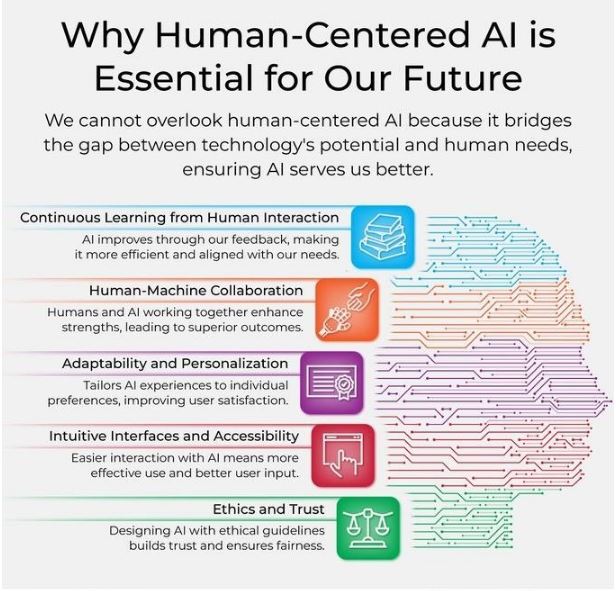In the rapidly evolving landscape of Artificial Intelligence (AI), the concept of human-centered AI has emerged as a critical focus. As AI technologies like Machine Learning (ML) and Big Data continue to advance, ensuring that these innovations are designed with human needs and values at the forefront is more important than ever. This article delves into why human-centered AI is essential for our future and how it can shape a more equitable and ethical technological landscape.

The Importance of Human-Centered AI
Human-centered AI emphasizes the integration of human values, ethics, and societal needs into the development and deployment of AI systems. This approach ensures that AI technologies are not only efficient and effective but also fair, transparent, and accountable. The goal is to create AI systems that enhance human capabilities and well-being rather than replace or undermine them.
Ethical Considerations
One of the primary concerns with AI development is the ethical implications. AI systems can inadvertently perpetuate biases present in their training data, leading to unfair or discriminatory outcomes. Human-centered AI aims to address these issues by incorporating ethical guidelines and diverse perspectives into the design process. This approach helps mitigate biases and ensures that AI systems are more inclusive and equitable.
Enhancing Human Capabilities
Rather than replacing human workers, human-centered AI focuses on augmenting human capabilities. For instance, AI can assist in complex decision-making processes, provide personalized education, and enhance healthcare delivery. By working alongside humans, AI can help achieve better outcomes and improve overall efficiency.
Accountability and Transparency
Transparency and accountability are crucial for building trust in AI systems. Human-centered AI promotes the development of explainable AI models that provide clear and understandable insights into how decisions are made. This transparency helps users understand and trust AI systems, leading to broader acceptance and adoption.
Real-World Applications
Healthcare
In healthcare, human-focussed AI can revolutionize patient care by providing personalized treatment plans, predicting disease outbreaks, and improving diagnostic accuracy. AI systems can analyze vast amounts of medical data to identify patterns and recommend interventions, ultimately enhancing patient outcomes.
Education
In the education sector, AI can offer personalized learning experiences tailored to individual students’ needs. By analyzing students’ performance data, AI can identify areas where they need additional support and provide customized resources to help them succeed.
Workplace Efficiency
In the workplace, human-centered AI can streamline operations and improve productivity. For example, AI-powered tools can automate repetitive tasks, allowing employees to focus on more strategic and creative activities. This shift not only boosts efficiency but also enhances job satisfaction and employee well-being.
Challenges and Considerations
Data Privacy and Security
With the increasing use of AI, data privacy and security have become significant concerns. Human-centered AI must prioritize protecting individuals’ data and ensuring that AI systems comply with relevant regulations and standards. This approach helps build trust and confidence in AI technologies.
Regulatory Frameworks
Developing robust regulatory frameworks is essential for guiding the ethical use of AI. Governments and organizations must collaborate to establish guidelines that promote responsible AI development and deployment. These frameworks should address issues such as data privacy, bias mitigation, and accountability.
Public Perception and Trust
Building public trust in AI technologies is crucial for their widespread adoption. Human-centered AI can help achieve this by demonstrating the tangible benefits of AI while addressing ethical and societal concerns. Engaging with diverse stakeholders and fostering open dialogue can also contribute to building trust and acceptance.
Conclusion

Human-centered AI represents a paradigm shift in how we approach AI development and deployment. By prioritizing human values, ethics, and societal needs, we can create AI systems that enhance human capabilities, promote fairness, and build trust. As we move forward, it is essential to continue advocating for human-centered AI to ensure a future where technology serves humanity’s best interests.
For further reading on the ethical implications and regulatory considerations of AI, you can refer to This Week in AI: AI isn’t world-ending ”but it’s still plenty harmful and CIO’s concerns over generative AI echo those of the early days of cloud computing.
Check out more AI tools.
Elevate Guest Experience with RoomGenie
Textify Analytics – Affordable Insights at the Speed of AI
